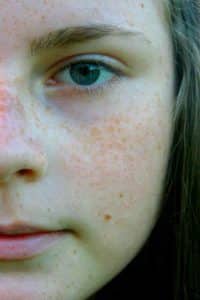 Your skin is the largest organ in your body and is designed to protect you from the harmful effects of the environment. Your skin deserves your loving care every day. To that end, it’s a good idea to form the habit of checking your body all over once a month for any abnormalities or changes to existing moles. Why? Because a new or changing skin condition may indicate a more serious medical problem. You have a better chance of eliminating a serious condition later on with early detection and treatment.
Your skin is the largest organ in your body and is designed to protect you from the harmful effects of the environment. Your skin deserves your loving care every day. To that end, it’s a good idea to form the habit of checking your body all over once a month for any abnormalities or changes to existing moles. Why? Because a new or changing skin condition may indicate a more serious medical problem. You have a better chance of eliminating a serious condition later on with early detection and treatment.
Here are a few of the most common types of skin growths to look for:
- Seborrheic keratoses protrude from your skin. They range in color from light brown to black and may develop on your chest, face, under your breasts or your back as you age. There is no known cause for seborrheic keratoses, but they’re typically harmless.
- Freckles appear as spots on your skin. Fair-skinned people are more susceptible, and commonly develop freckles on their face, shoulders, and arms. Typically, they become darker during sunnier months. Freckles are not usually a cause for concern and do not need to be removed but they can be indicative of frequent sun exposure.
- Moles also protrude from your skin and are typically brown or black. Many moles form before the age of 30 and can slowly evolve over time. You may have singular moles or moles that appear in bunches. Moles can be removed for either medical or cosmetic purposes. Watch your moles for changes in shape, size or color, as this may possibly indicate skin cancer.
- Lentigines are dark spots that appear as a result of sun damage. They are most common in the aging population. They are easily eliminated with topical medication or laser therapy.
- Skin tags are flesh-colored flaps of skin that often grown in your armpit, under your breasts, on your neck or in your groin area. They do not usually pose a threat to your health but they can be removed for cosmetic purposes.
Another good idea is to call and schedule an appointment with Dr. Shel. She can examine your body and diagnose any skin growth that may be of concern to you: 281-698-7435.


















